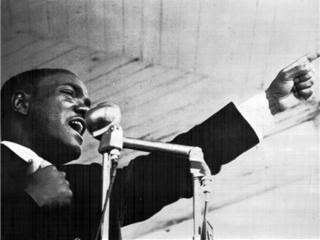SIR RANDOL FAWKES AND MAJORITY RULE
“BAY STREET
The
Monday, February 6th, 1967
Jim Bishop: Reporter
A silent horror fell over the mansions in the limestone hills. A revolution was in progress. No bullets bounced off the elegant façade of Governor Sir Ralph Grey’s mansion. The work was being done with ballots. Ironically, this had been the weapon used by the Bay Street Boys to maintain power over the natives.
ONE BY ONE, the natives began to win the seats. Dr. McMillan in Fort Charlotte; Maurice Moore in Grand Bahama East; Thompson in Eleuthra; Levartiy in Bimini and West End; Pindling himself in South Andros. When all the returns had been counted, it was obvious that the P.L.P. had eighteen seats; the U.P.B. had eighteen; A.R. Braynen, an independent, had one; Randol Fawkes and his Labour party had one.
Nobody had a clear majority. The winning party always furnishes the Speaker of the House from the elected Assembly, and neither side could do it without dropping to seventeen votes. At once a night battle began for Braynen’s vote, more important Fawkes’!
Lynden Pindling offered Braynen the Speakership, and it was accepted. The Speaker had no vote, except when the House is tied. So contending forces remained 18-18. Fawkes was in his St. Barnabas district, listening to the plaudits of his adherents, when-so he says-the Premier himself paid a personal visit.
SIR ROLAND SYMONETTE is accustomed to having people come to him. He knew and so did Fawkes, that revolution hinged on a solitary vote. If Bay Street Boys could bring Randol Fawkes to their side, at any price, Pindling and his “colored “government was stillborn. “Name you terms,” the Premier said. “Whatever it is, we will meet it.”
Fawkes has a boyish grin that hides embarrassment. He poured it on. A few years earlier he had been banished from the islands; had carried cakes of ice in
The Negro said he was sorry. He had decided to go along with Pindling. He had no terms; no price. It is incredible that, in a lazy group of islands where votes can be bought like seashells, man chose not to be rich. The answer was, “No.”
This gave Lynden O. Pindling a Speaker and a 19-18 majority in the House. Sir Roland and his Government resigned. That night people danced in the streets. Black-tie diners in the Bahamian Club and

